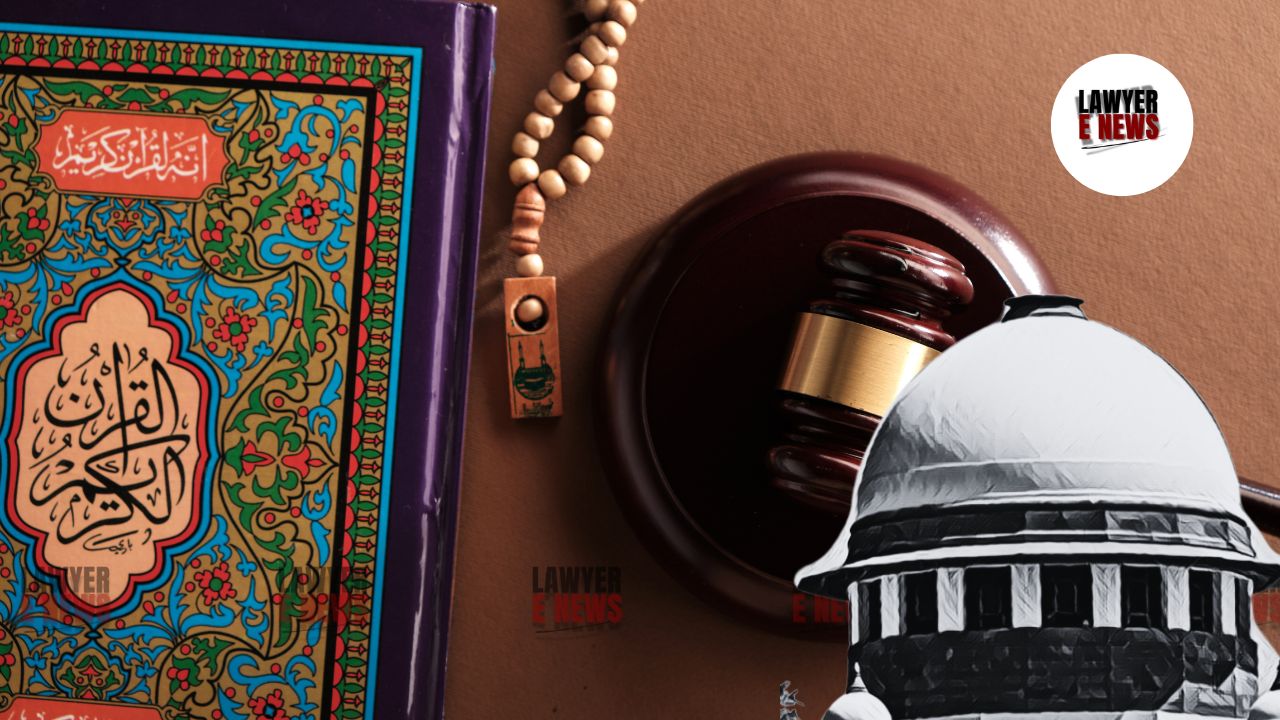-
by Admin
15 February 2026 5:35 AM



“The Succession Act Clearly Says It Will Not Apply to a Muslim”: Supreme Court Highlights Legal Challenge in Petition Seeking Exclusion from Sharia Law. On October 23, 2024, the Supreme Court of India sought a response from the Union of India in a writ petition filed by a Kerala-based woman, Safiya P.M., who was born into Islam but now identifies as a non-believer. Safiya’s petition seeks a declaration that she should be governed by secular laws such as the Indian Succession Act, 1925, instead of the Muslim Personal Law (Shariat) Application Act, 1937.
A bench comprising Chief Justice D.Y. Chandrachud, Justice J.B. Pardiwala, and Justice Manoj Misra issued the notice to the Union, directing the government to file a counter-affidavit. While hearing the matter, the Court remarked that the Indian Succession Act, 1925, explicitly excludes its application to Muslims, posing a legal challenge to the petitioner’s request.
"This Will Require Consideration": Court Seeks Government's Stand on Opting Out of Sharia Law
The petition raises critical constitutional questions about an individual’s right to renounce religious law and be governed by secular laws. At the outset, Advocate Prashant Padmanabhan, appearing for Safiya, informed the Court that the case had come up for the first time since notice was issued in May 2024.
Representing the Union, Additional Solicitor General (ASG) Aishwarya Bhati acknowledged the petition’s significance but highlighted the complexity of the issue. Bhati pointed out that Safiya, while born into Islam, now seeks to be governed by the Indian Succession Act, 1925—a statute that explicitly does not apply to Muslims. Bhati also informed the Court that the government is considering the Uniform Civil Code (UCC), although no legislative action has been taken yet.
"UCC is being considered by the government, my Lord. We don’t know if the legislature will consider it," Bhati submitted.
The bench, after considering the submissions, remarked,
"This will require consideration. You file a counter since we have issued notice."
ASG Bhati assured the Court that the government would respond with a counter-affidavit.
Petition Challenges the Applicability of Muslim Personal Law
The petition, filed by Safiya P.M., General Secretary of the "Ex-Muslims of Kerala" organization, challenges the automatic application of Muslim Personal Law to individuals born into Islam. Safiya contends that, having renounced the faith, she should not be governed by Sharia law, particularly in matters related to intestate and testamentary succession. She argues that as a non-believer, her civil rights should be protected under secular statutes like the Indian Succession Act, 1925, which governs inheritance and succession in India for non-Muslims.
Safiya’s petition also emphasizes the broader implications for individuals who wish to opt out of religious personal laws, particularly when these laws impose restrictions on inheritance and other civil rights. The petitioner highlights the fact that under Sharia law, apostates may forfeit their inheritance rights, a provision that raises concerns for her and her daughter’s future.
The writ petition states:
"Persons who do not want to be governed by the Muslim Personal Law must be allowed to be governed by the secular law of the country, viz., the Indian Succession Act, 1925, both in the case of intestate and testamentary succession."
Legal Vacuum: No Mechanism to Opt Out of Muslim Personal Law
The petitioner points out that under the current legal framework, there is no statutory provision allowing individuals born into Islam to formally opt out of Muslim Personal Law. She argues that this absence constitutes a legislative gap that infringes upon her fundamental rights under Article 25 of the Constitution, which guarantees the right to freedom of religion, including the right to renounce one’s faith. Safiya contends that without legal recognition of her right to be governed by secular law, her constitutional rights are rendered meaningless.
"The petitioner wishes to get a declaration that she shall not be governed by Muslim Personal Law for any of the matters listed in Sections 2 or 3 of the Muslim Personal Law [Shariat] Application Act, 1937, but there is no provision either in the Act or in the Rules wherein she can obtain such a certificate," the petition reads.
The plea calls on the Supreme Court to address this legislative vacuum through judicial interpretation.
Pending Case on Succession Among Muslim Women
The petition also draws attention to a related case, SLP (Civil) No. 9546 of 2016, which deals with the issue of succession among Muslim women. Safiya’s plea urges the Court to consider the broader implications of her case alongside the pending matter, emphasizing that the right to inheritance and succession is fundamental to ensuring gender equality and civil rights for all citizens, regardless of their religious background.
Call for Judicial Intervention
Safiya's petition underscores the challenges faced by individuals who seek to distance themselves from religious personal laws while advocating for governance under secular statutes. The Supreme Court’s notice to the Union of India marks the first step in a legal battle that raises important questions about personal liberty, freedom of religion, and the application of secular laws in India. The government’s forthcoming counter-affidavit is expected to address these constitutional questions, particularly in light of the ongoing debate on a Uniform Civil Code.
The next hearing in the case will take place after the Union files its response.
Safiya P.M. v. Union of India & Anr., Writ Petition (Civil) No.135/2024
